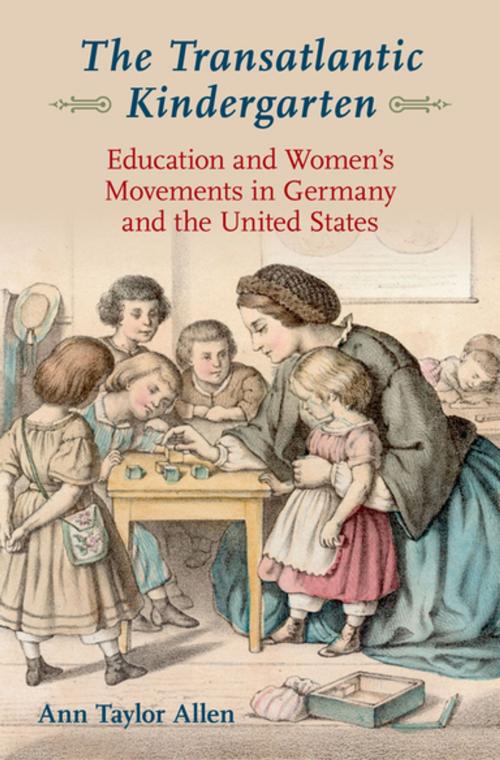The Transatlantic Kindergarten
Education and Women's Movements in Germany and the United States
Nonfiction, History, Germany, Americas, United States, 19th Century| Author: | Ann Taylor Allen | ISBN: | 9780190274436 |
| Publisher: | Oxford University Press | Publication: | January 2, 2017 |
| Imprint: | Oxford University Press | Language: | English |
| Author: | Ann Taylor Allen |
| ISBN: | 9780190274436 |
| Publisher: | Oxford University Press |
| Publication: | January 2, 2017 |
| Imprint: | Oxford University Press |
| Language: | English |
The kindergarten--as institution, as educational philosophy, and as social reform movement--is one of Germany's most important contributions to the world. Swiss pedagogue Johann Heinrich Pestalozzi and his German student Friedrich Fröbel, who founded the kindergarten movement around 1840, envisioned kindergartens as places of education and creative engagement for children across all classes, not merely as daycare centers for poor families. At first, however, Germany proved an inhospitable environment for this new institution. After the failure of the 1848 revolutions, several German governments banned the kindergarten as a hotbed of subversion because of its links to women's rights movements. German revolutionaries who were forced into exile introduced the kindergarten to the United States, where it soon found roots among native-born as well as immigrant educators. In an era when convention limited middle-class women to the domestic sphere, the kindergarten provided them with a rare opportunity not only for professional work, but also for involvement in social reform in the fields of education and child welfare. Through three generations, American and German women established many kinds of contacts In this elegant book, Ann Taylor Allen presents the first transnational history of the kindergarten as it developed in Germany and the United States between 1840 and World War I. Based on a large body of previously untapped sources in bothcountries, The Transatlantic Kindergarten shows how a common body of ideas and practices adapted over time to two very different political and social environments. Since the end of the First World War, early childhood education in the United States and Germany has followed the patterns laid down in the nineteenth century. However, as Allen's nuanced analysis suggests, the provision of public preschool education is still an unfinished and much discussed project on both sides of the Atlantic.
The kindergarten--as institution, as educational philosophy, and as social reform movement--is one of Germany's most important contributions to the world. Swiss pedagogue Johann Heinrich Pestalozzi and his German student Friedrich Fröbel, who founded the kindergarten movement around 1840, envisioned kindergartens as places of education and creative engagement for children across all classes, not merely as daycare centers for poor families. At first, however, Germany proved an inhospitable environment for this new institution. After the failure of the 1848 revolutions, several German governments banned the kindergarten as a hotbed of subversion because of its links to women's rights movements. German revolutionaries who were forced into exile introduced the kindergarten to the United States, where it soon found roots among native-born as well as immigrant educators. In an era when convention limited middle-class women to the domestic sphere, the kindergarten provided them with a rare opportunity not only for professional work, but also for involvement in social reform in the fields of education and child welfare. Through three generations, American and German women established many kinds of contacts In this elegant book, Ann Taylor Allen presents the first transnational history of the kindergarten as it developed in Germany and the United States between 1840 and World War I. Based on a large body of previously untapped sources in bothcountries, The Transatlantic Kindergarten shows how a common body of ideas and practices adapted over time to two very different political and social environments. Since the end of the First World War, early childhood education in the United States and Germany has followed the patterns laid down in the nineteenth century. However, as Allen's nuanced analysis suggests, the provision of public preschool education is still an unfinished and much discussed project on both sides of the Atlantic.















